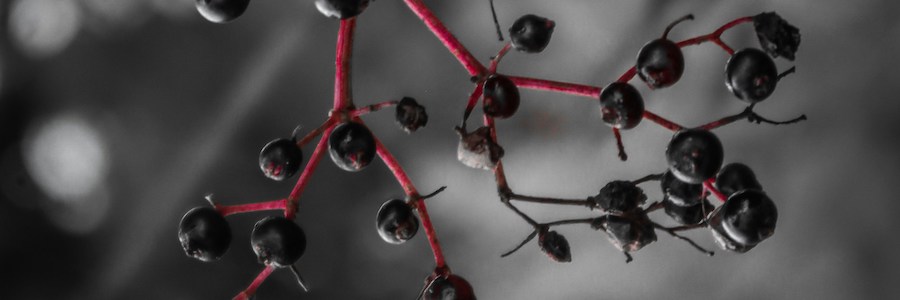Elderberries, which are booming in popularity here at home and globally, could become the next big specialty crop grown in California.
The global elderberry industry is booming. The wellness supplement market alone exceeded $1 billion in sales in 2023 and is expected to nearly triple in a decade.
The majority of elderberries juicing the fast-growing industry globally, which includes food, beverage, body care and other types of products in addition to nutritional supplements, are grown overseas in Europe and Asia, but the domestic market is already valued at about $320 million annually, with 30 percent growth predicted over the decade. It’s a young and booming market and a potentially strong opportunity for farmers in California.
Currently, most of the elderberry-growing action in the U.S. is happening east of the Rocky Mountains, where the black elderberry has been a significant commercial crop for about two decades.
West of the Rockies, including in California, the blue elderberry is the dominant native species.
But unlike their brethren in the east, farmers in the west including in California the nation’s leading specialty crop state, haven’t embraced elderberry-growing like they have with other types of berries. But that could change soon.
The blue elderberry grows wild like a weed across all sorts of microclimates, from mountaintops and valley floors to residential backyards, abandoned lots and highway ditches. According to University of California scientists, It’s drought-tolerant and climate change-resilient, which bodes well for the west, which is getting warmer and dryer. The blue elderberry also works to fight erosion and enhances the productivity of nearby crops wherever it grows. It’s a crop that improves sustainability for farmers.
The reasons California and other western state farmers haven’t focused on growing elderberries to date is pretty simple.
First, with over 400 crops already grown in the state, California farmers have an embarrassment of riches to choose from, unlike growers in the east and Midwest where farming conditions are much more limiting.
Additionally, although substantial, the elderberry market has only started to boom over the last few years, as new product development and new market creation have come into their own in a significant way. Much of this growing popularity and future mega-growth can be attributed to a growing body of scientific research that points to the health and wellness benefits elderberries offer people.
There’s a dearth of knowledge on how to best propagate and grow the blue elderberry. It’s much wilder than the black elderberry, for example, and it’s considered harder to grow from a commercial standpoint, as well as having the tendency to deliver inconsistent harvests from plant-to-plant. There also are potential flavor differences (from the black elderberry) and nutrient level issues that have to be worked out in terms of using them in the existing ingredient marketplace, which to date is comprised almost entirely of black elderberries.

These questions and more though are being addressed in a significant way by scientists and farmers in two major research projects that could usher in the beginnings of another major specialty crop – blue elderberries – and a related industry (processing, product creation, sales) in California.
First, UC ANR (the University of California’s agriculture and natural resources consortium) is doing in-depth work on the commercialization of elderberries in California.
It’s Sustainable Agriculture Research and Education Program is collaborating with Cloverleaf Farm in Solano County and several other growers in the Central Valley and coastal counties to assess and develop the potential for blue elderberries to become a commercial specialty crop, with a focus on hedgerow-grown elderberry production and marketing for California farms. A production and marketing guide, cost and return study and market analysis will be produced as a result of the research, and farmer and buyer outreach activities will be done. Elderberries will also be analyzed for flavor and nutrition components.
Additionally, another major project is a five-year, $5 million federally funded farming experiment that began in November 2023 in California’s Santa Barbara County. Led by the White Buffalo Land Trust, a regenerative agriculture nonprofit, the project is also exploring how to best propagate and cultivate blue elderberries on a number of Central Coast farms.
Job one for the scientists and farmers working on the Santa Barbara County project is to tame, propagate and cultivate the wild blue elderberry. But that’s not all. They’re also collaborating
with a newly-built facility in Santa Maria to investigate how to best process the blue elderberries into finished goods.
Indigenous peoples in California consumed and used blue elderberries regularly. This cultural component is built into the five-year project. The Santa Ynez Band of Chumash are involved in the project and plan to develop a nursery, create a workforce skills program and harvest the new blue elderberry plantings at the various farms for their cultural needs.
These two projects are opening the door to taming the wild blue elderberry and creating the beginnings of what could eventually become a significant new crop and industry in California
Elderberries as a hedgerow crop also may have the potential to combine crop production with environmental conservation functions in a way not typically seen on California farms, according to Sonja Brodt, a principal researcher at the UC Sustainable Agriculture Research and Education Program. She and the other UC researchers hope this model will enable small and medium scale farmers to receive a direct income from a farm practice – growing blue elderberries – that benefits the ecosystem as well.
My Job Depends on Ag Magazine columnist and contributing editor Victor Martino is an agrifood industry consultant, entrepreneur and writer. One of his passions and current projects is working with farmers who want to develop their own branded food products. You can contact him at: [email protected].







